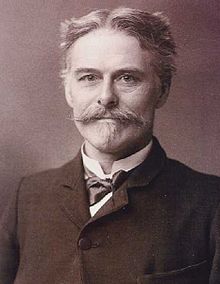Edward Drinker Cope
| Edward Drinker Cope | |
|---|---|
 |
|
| Born |
July 28, 1840 Philadelphia, Pennsylvania, U.S. |
| Died | April 12, 1897 (aged 56) Philadelphia, Pennsylvania, U.S. |
| Nationality | American |
| Fields | Paleontology, zoology, herpetology |
| Notable awards | Bigsby Medal (1879) |
Edward Drinker Cope (July 28, 1840 – April 12, 1897) was an American paleontologist and comparative anatomist, as well as a noted herpetologist and ichthyologist. He was a founder of the Neo-Lamarckism school of thought. Born to a wealthy Quaker family, Cope distinguished himself as a child prodigy interested in science; he published his first scientific paper at the age of 19. Though his father tried to raise Cope as a gentleman farmer, he eventually acquiesced to his son's scientific aspirations. Cope married his cousin and had one child; the family moved from Philadelphia to Haddonfield, New Jersey, although Cope would maintain a residence and museum in Philadelphia in his later years.
Cope had little formal scientific training, and he eschewed a teaching position for field work. He made regular trips to the American West, prospecting in the 1870s and 1880s, often as a member of United States Geological Survey teams. A personal feud between Cope and paleontologist Othniel Charles Marsh led to a period of intense fossil-finding competition now known as the Bone Wars. Cope's financial fortunes soured after failed mining ventures in the 1880s, forcing him to sell off much of his fossil collection. He experienced a resurgence in his career toward the end of his life before dying on April 12, 1897.
Though Cope's scientific pursuits nearly bankrupted him, his contributions helped to define the field of American paleontology. He was a prodigious writer, with 1,400 papers published over his lifetime, although his rivals debated the accuracy of his rapidly published works. He discovered, described, and named more than 1,000 vertebrate species, including hundreds of fishes and dozens of dinosaurs. His proposal for the origin of mammalian molars is notable among his theoretical contributions. "Cope's rule", however, the hypothesis that mammalian lineages gradually grow larger over geologic time, while named after him, is "neither explicit nor implicit" in his work.
...
Wikipedia
